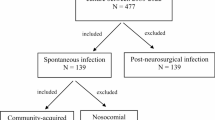Abstract
Background:
To delineate the epidemiologic trend, clinical characteristics and therapeutic outcomes of bacterial meningitis in young adults in southern Taiwan.
Patients and Methods:
Over a period of 18 years, 329 cases of culture-proven adult bacterial meningitis were identified at our hospital. Among these 329 cases, 62 were identified as young adults (≤ 40 years) and their clinical features, laboratory data and therapeutic outcomes were reviewed. The prognostic factors between fatal and non-fatal groups were compared.
Results:
The 62 young adults were 48 men and 14 women, aged 17–40 years. Thirty of the 62 patients belonged to nosocomial infection, and the other 32 belonged to community-acquired infection. A total of 74% (46/62) of the patients had a postneurosurgical state as the underlying condition. Alcoholism (n = 8) was the most common underlying condition of the other 16 patients with spontaneous meningitis. Of these 62 patients, Klebsiella pneumoniae (12) and Pseudomonas aeruginosa (9) were the most common implicated gram-negative pathogens. During the late study period, there was an increase in coagulase-negative staphylococcus and Staphylococcus aureus infections. The therapeutic results of this group of patients are as follows: 13 patients died, 18 had full recovery and 31 had varying degrees of neurologic deficits. Impaired consciousness and thrombocytopenia were significant prognostic factors.
Conclusion:
A postneurosurgical state is an important preceding event for young adults to develop bacterial meningitis. Of the implicated gram-negative pathogens, K. pneumoniae and P. aeruginosa are common; however, there has been an increase in staphylococcal infection in recent years. Therapeutic results of this specific group of patients showed that 20% (13/62) of the patients died, and 50% (31/61) of the patients in this study had neurologic deficits. However, the small case number and possible bias of case selection has limited the analytical conclusions of this study. Further large-scale studies are needed to delineate the clinical characteristics and therapeutic outcomes of bacterial meningitis in this specific group of patients.
Similar content being viewed by others
Author information
Authors and Affiliations
Corresponding author
Rights and permissions
About this article
Cite this article
Tsai, MH., Lu, CH., Huang, CR. et al. Bacterial Meningitis in Young Adults in Southern Taiwan: Clinical Characteristics and Therapeutic Outcomes. Infection 34, 2–8 (2006). https://doi.org/10.1007/s15010-006-4144-6
Received:
Accepted:
Issue Date:
DOI: https://doi.org/10.1007/s15010-006-4144-6




